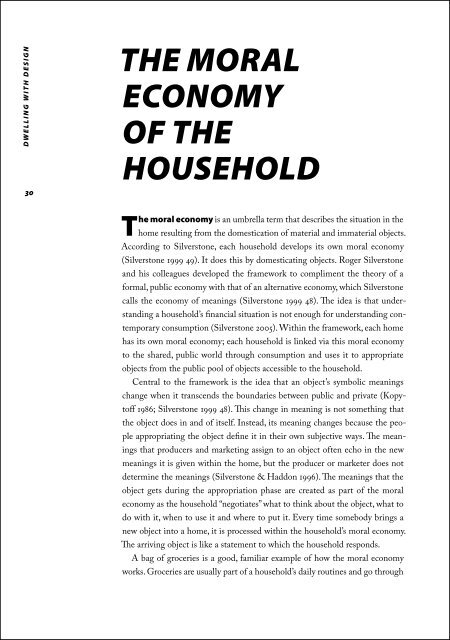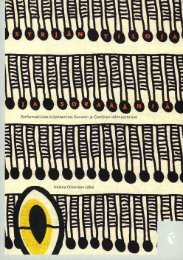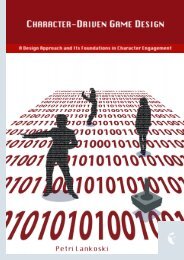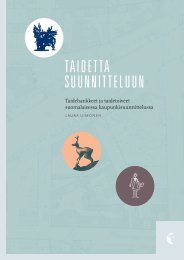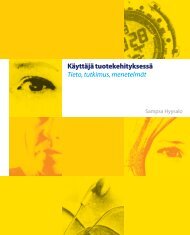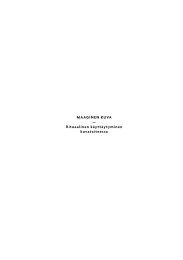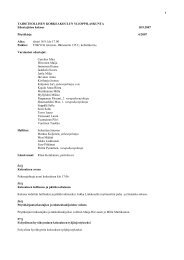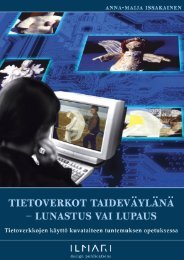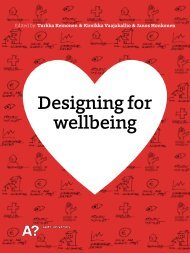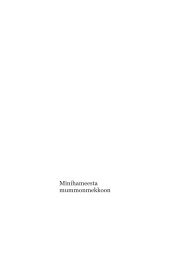- Page 1 and 2: Heidi Paavilainen Dwelling with des
- Page 3 and 4: Aalto University publication series
- Page 5 and 6: 3 DESIGN ENTERS HOME 88 Introductio
- Page 7 and 8: Acknowledgements A C K N O W L E D
- Page 9: 9A C K N O W L E D G E M E N T S
- Page 12 and 13: D W E L L I N G W I T H D E S I G N
- Page 14 and 15: D W E L L I N G W I T H D E S I G N
- Page 16 and 17: D W E L L I N G W I T H D E S I G N
- Page 18 and 19: D W E L L I N G W I T H D E S I G N
- Page 20 and 21: D W E L L I N G W I T H D E S I G N
- Page 22 and 23: D W E L L I N G W I T H D E S I G N
- Page 24 and 25: D W E L L I N G W I T H D E S I G N
- Page 26 and 27: D W E L L I N G W I T H D E S I G N
- Page 28 and 29: D W E L L I N G W I T H D E S I G N
- Page 32 and 33: D W E L L I N G W I T H D E S I G N
- Page 34 and 35: D W E L L I N G W I T H D E S I G N
- Page 36 and 37: D W E L L I N G W I T H D E S I G N
- Page 38 and 39: D W E L L I N G W I T H D E S I G N
- Page 40 and 41: D W E L L I N G W I T H D E S I G N
- Page 42 and 43: D W E L L I N G W I T H D E S I G N
- Page 44 and 45: D W E L L I N G W I T H D E S I G N
- Page 46 and 47: D W E L L I N G W I T H D E S I G N
- Page 48 and 49: D W E L L I N G W I T H D E S I G N
- Page 50 and 51: D W E L L I N G W I T H D E S I G N
- Page 52 and 53: D W E L L I N G W I T H D E S I G N
- Page 54 and 55: D W E L L I N G W I T H D E S I G N
- Page 56 and 57: D W E L L I N G W I T H D E S I G N
- Page 58 and 59: D W E L L I N G W I T H D E S I G N
- Page 60 and 61: D W E L L I N G W I T H D E S I G N
- Page 62 and 63: D W E L L I N G W I T H D E S I G N
- Page 65 and 66: 65 definiNG DESIGN
- Page 67 and 68: Classifying design 2 D E F I N I N
- Page 69 and 70: I furniture (321) II lamps (168) II
- Page 71 and 72: to study how the interviewees talke
- Page 73 and 74: the list does, it reflects how the
- Page 75 and 76: was limited to fun, nice and very h
- Page 77 and 78: During the interviews, 16 household
- Page 79 and 80: M: But it was almost darker than th
- Page 81 and 82:
T: This really doesn’t have any p
- Page 83 and 84:
Summary 2 D E F I N I N G D E S I G
- Page 85:
paradox is also evident in my data.
- Page 88 and 89:
D W E L L I N G W I T H D E S I G N
- Page 90 and 91:
D W E L L I N G W I T H D E S I G N
- Page 92 and 93:
D W E L L I N G W I T H D E S I G N
- Page 94 and 95:
D W E L L I N G W I T H D E S I G N
- Page 96 and 97:
D W E L L I N G W I T H D E S I G N
- Page 98 and 99:
D W E L L I N G W I T H D E S I G N
- Page 100 and 101:
D W E L L I N G W I T H D E S I G N
- Page 102 and 103:
D W E L L I N G W I T H D E S I G N
- Page 104 and 105:
D W E L L I N G W I T H D E S I G N
- Page 106 and 107:
D W E L L I N G W I T H D E S I G N
- Page 108 and 109:
D W E L L I N G W I T H D E S I G N
- Page 110 and 111:
D W E L L I N G W I T H D E S I G N
- Page 112 and 113:
D W E L L I N G W I T H D E S I G N
- Page 114 and 115:
D W E L L I N G W I T H D E S I G N
- Page 116 and 117:
D W E L L I N G W I T H D E S I G N
- Page 118 and 119:
D W E L L I N G W I T H D E S I G N
- Page 120 and 121:
D W E L L I N G W I T H D E S I G N
- Page 122 and 123:
D W E L L I N G W I T H D E S I G N
- Page 124 and 125:
D W E L L I N G W I T H D E S I G N
- Page 126 and 127:
D W E L L I N G W I T H D E S I G N
- Page 128 and 129:
D W E L L I N G W I T H D E S I G N
- Page 130 and 131:
D W E L L I N G W I T H D E S I G N
- Page 132 and 133:
D W E L L I N G W I T H D E S I G N
- Page 134 and 135:
D W E L L I N G W I T H D E S I G N
- Page 136 and 137:
D W E L L I N G W I T H D E S I G N
- Page 138 and 139:
D W E L L I N G W I T H D E S I G N
- Page 140 and 141:
D W E L L I N G W I T H D E S I G N
- Page 142 and 143:
D W E L L I N G W I T H D E S I G N
- Page 144 and 145:
D W E L L I N G W I T H D E S I G N
- Page 146 and 147:
D W E L L I N G W I T H D E S I G N
- Page 148 and 149:
D W E L L I N G W I T H D E S I G N
- Page 150 and 151:
D W E L L I N G W I T H D E S I G N
- Page 153 and 154:
STORING DESIGN
- Page 155 and 156:
165 P 165. Anniina’s shelf 4 S T
- Page 157 and 158:
A bit later Janne outlined what had
- Page 159 and 160:
to, show off to. As against actual
- Page 161 and 162:
168 169 4 S T O R I N G D E S I G N
- Page 163 and 164:
colours and sizes. And this is simp
- Page 165 and 166:
sizes; there are 2-seaters, comfort
- Page 167 and 168:
T: this has been protected like not
- Page 169 and 170:
least fondly talked about. The prod
- Page 171 and 172:
Other examples are a vintage dress,
- Page 173 and 174:
190 191 4 S T O R I N G D E S I G N
- Page 175 and 176:
the right spot, once the right spot
- Page 177 and 178:
197 198 4 S T O R I N G D E S I G N
- Page 179 and 180:
204 P 204. Janne’s sofa 4 S T O R
- Page 181 and 182:
205 262 4 S T O R I N G D E S I G N
- Page 183 and 184:
H: it’s some sort of aesthetic (p
- Page 185 and 186:
to call the latter designs “dista
- Page 187:
4 S T O R I N G D E S I G N 187
- Page 190 and 191:
D W E L L I N G W I T H D E S I G N
- Page 192 and 193:
D W E L L I N G W I T H D E S I G N
- Page 194 and 195:
D W E L L I N G W I T H D E S I G N
- Page 196 and 197:
D W E L L I N G W I T H D E S I G N
- Page 198 and 199:
D W E L L I N G W I T H D E S I G N
- Page 200 and 201:
D W E L L I N G W I T H D E S I G N
- Page 202 and 203:
D W E L L I N G W I T H D E S I G N
- Page 204 and 205:
D W E L L I N G W I T H D E S I G N
- Page 206 and 207:
D W E L L I N G W I T H D E S I G N
- Page 208 and 209:
D W E L L I N G W I T H D E S I G N
- Page 210 and 211:
D W E L L I N G W I T H D E S I G N
- Page 212 and 213:
D W E L L I N G W I T H D E S I G N
- Page 214 and 215:
D W E L L I N G W I T H D E S I G N
- Page 216 and 217:
D W E L L I N G W I T H D E S I G N
- Page 218 and 219:
D W E L L I N G W I T H D E S I G N
- Page 220 and 221:
D W E L L I N G W I T H D E S I G N
- Page 222 and 223:
D W E L L I N G W I T H D E S I G N
- Page 224 and 225:
D W E L L I N G W I T H D E S I G N
- Page 226 and 227:
D W E L L I N G W I T H D E S I G N
- Page 228 and 229:
D W E L L I N G W I T H D E S I G N
- Page 231 and 232:
DESIGN limbo
- Page 233 and 234:
Consequently, it started to seem th
- Page 235 and 236:
252 253 6 D E S I G N L I M B O 254
- Page 237 and 238:
256 P 256. Sanna & Kalevi’s sofa
- Page 239 and 240:
for now, the study chair which, esp
- Page 241 and 242:
259 260 6 D E S I G N L I M B O 241
- Page 243 and 244:
261 P 261. Sanna & Kalevi’s livin
- Page 245 and 246:
example. In 2004, he talked about h
- Page 247 and 248:
little in the interviewees’ comme
- Page 249:
design in the household. I have als
- Page 252 and 253:
D W E L L I N G W I T H D E S I G N
- Page 254 and 255:
D W E L L I N G W I T H D E S I G N
- Page 256 and 257:
D W E L L I N G W I T H D E S I G N
- Page 258 and 259:
D W E L L I N G W I T H D E S I G N
- Page 260 and 261:
D W E L L I N G W I T H D E S I G N
- Page 262 and 263:
D W E L L I N G W I T H D E S I G N
- Page 264 and 265:
D W E L L I N G W I T H D E S I G N
- Page 266 and 267:
D W E L L I N G W I T H D E S I G N
- Page 268 and 269:
D W E L L I N G W I T H D E S I G N
- Page 270 and 271:
D W E L L I N G W I T H D E S I G N
- Page 272 and 273:
D W E L L I N G W I T H D E S I G N
- Page 274 and 275:
D W E L L I N G W I T H D E S I G N
- Page 276 and 277:
D W E L L I N G W I T H D E S I G N
- Page 278 and 279:
D W E L L I N G W I T H D E S I G N
- Page 280 and 281:
D W E L L I N G W I T H D E S I G N
- Page 282 and 283:
D W E L L I N G W I T H D E S I G N
- Page 284 and 285:
D W E L L I N G W I T H D E S I G N
- Page 286 and 287:
D W E L L I N G W I T H D E S I G N
- Page 288 and 289:
D W E L L I N G W I T H D E S I G N
- Page 290 and 291:
D W E L L I N G W I T H D E S I G N
- Page 292 and 293:
D W E L L I N G W I T H D E S I G N
- Page 294 and 295:
D W E L L I N G W I T H D E S I G N
- Page 296 and 297:
D W E L L I N G W I T H D E S I G N
- Page 298 and 299:
D W E L L I N G W I T H D E S I G N
- Page 300 and 301:
D W E L L I N G W I T H D E S I G N
- Page 302:
Dwelling with Design offers a throu


